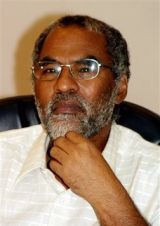Lawyers raise doubt over confessions of journalist killers
April 7, 2008, 2008 (KHARTOUM) — The lives of 10 Darfuris convicted of killing a prominent Sudanese journalist in 2006 are hanging in the balance as their lawyers struggle to prove that their confessions were extracted under torture.

The 10 men were sentenced in November 2007 for beheading Mohamed Taha Mohamed Ahmed, the well-known editor of the daily al-Wifaq newspaper. Taha was accused of blasphemy in May 2005 for publishing an article questioning the origins of Prophet Mohammad. These charges were later dropped, although angry crowds called for the death penalty.
All the men immediately appealed their sentence, but on March 8 the appeal was rejected. Their only recourse now is through the constitutional court.
The difficulty with allegations of torture is overcoming the hurdles set in the way of presenting a credible case.
To begin with, it is imperative that victims of torture are examined as early as possible in the proceedings.
“Too often, prisons and courts delay medical examinations so that torture cannot be proven,” said a medical doctor who works for a human rights organization. “Signs of torture disappear very quickly, and the perpetrators usually avoid leaving big scars.”
In addition, for a medical examination to be admissible in court, it must be carried out by persons from a government hospital appointed by the judge in the case. Examinations carried out by the staff of human rights organizations or independent hospitals are not acceptable.
Concerning the Taha case, the judge ruled that a medical examination could be carried out after the initial hearing had taken place. However, the legal team of the Darfuris never lodged an official application for the examination.
“We need better training for solicitors in Sudan,” said Sadiq Absul Salam, a psychologist who works at the Khartoum Center for Human Rights. “They need to know how they can deal with torture cases and how they can bring this evidence to the courts.”
Kamel Omar, the lead defense attorney, has repeatedly insisted that the confessions are invalid because they were obtained through torture. Omar was arrested and detained overnight for making these allegations, and he has refused to speak to IPS about the case.
However, his claims have been echoed by Mohamed Sherif, who worked on the case last year before resigning from the legal team.
“I think it is quite evident that torture did take place and that any sign of torture must throw into doubt the admissibility of the confessions,” he said.
There is some debate about whether torture is an endemic part of the Sudanese legal system, or whether the cases that have come to light simply represent isolated incidents.
Many human rights lawyers in the country claim that torture is a serious problem in Sudan, although due to client confidentiality issues they are often unable to provide concrete examples to substantiate these allegations. The Sudan Organization Against Torture, a London-based campaign group, also asserts that those who carry out torture in Sudan generally escape justice because they are part of the law-enforcement establishment.
However, Abdel-Moneim Osman — rapporteur at the Advisory Council for Human Rights, a governmental body — rejected the notion of institutionalized torture.
“Sudan is one of the countries with the lowest number of torture cases,” he said. “The only reason that human rights lawyers in Sudan talk about torture so much is for their own political ends and to garner international sympathy.”
He insisted that the trial of Taha’s killers was carried out fairly and that the claims of torture are unfounded. The convictions, he added, do not only rest on the confessions of the defendants, but also on hard evidence — although he was unable to produce this immediately.
Osman has just presented a report to the government calling on Sudan to sign up to the United Nations Convention Against Torture. But human rights lawyers and organizations say authorities should spend less time talking and more time taking action against alleged torturers.
“We must take steps to bring all those involved in torture to justice,” said a lawyer who declined to be named. “Until we root out all forms of torture in the country, we cannot be certain that the sentences handed down are the correct ones.”
Those convicted for the Taha killing are being held at Kobar prison in Sudan’s capital, Khartoum. Five other inmates of this institution, all farmers, were executed in February for the killing of another farmer in 2004.
In 2005, Human Rights Watch estimated that there were some 300 on death row in Sudan. According to a recent Amnesty International report, Sudan is the African nation that carries out the most executions each year, with more than 65 people having been put to death in 2006.
(IPS/GIN)
